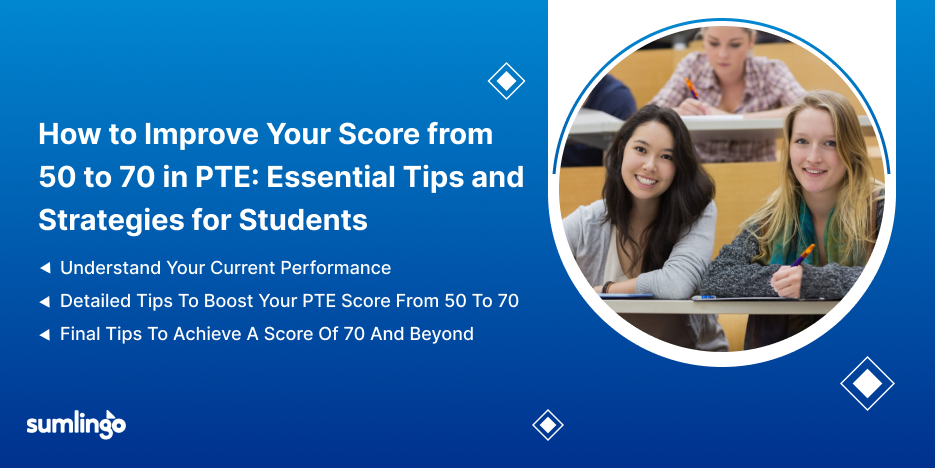Scoring between 50 and 70 in the Pearson Test of English (PTE) can be a turning point for many students and professionals aiming to meet university or immigration requirements. Improving your score from 50 to 70 is achievable with focused preparation, smart strategies, and awareness of common pitfalls. If you’re looking to boost your PTE score effectively, this guide will provide actionable tips and study methods to help you reach your target with confidence.
Understand Your Current Performance
Before diving into study tips, it’s important to analyze your current score report. Identify which sections: Speaking, Writing, Reading, or Listening, need the most improvement. PTE is a balanced test, so improving weak areas will contribute significantly to your overall score.
Are you ready to test your skills?
Detailed Tips to Boost Your PTE Score from 50 to 70
1. Develop a Structured Study Plan
Why it matters: Without a plan, your preparation can be unfocused and inefficient.
How to do it:
- Set a realistic target date for your exam and count down the weeks.
- Allocate more time to your weakest sections, but maintain daily practice for all.
- Break your study time into manageable chunks, for example, 1-hour sessions focused on one skill.
- Schedule weekly section-wise pte practice tests to monitor progress.
- Use a planner or digital calendar to track your study hours and progress.
2. Sharpen Your Speaking Skills with Practice and Feedback
Why it matters: Speaking is scored on fluency, pronunciation, and content quality.
- Practice Read Aloud tasks daily to improve clarity and rhythm. Focus on natural intonation rather than speed.
- For Repeat Sentence, listen carefully and try to recall exact phrases, improving your short- term memory.
- Speak or record yourself speaking, then listen back to spot areas like hesitation or mispronunciation.
- Focus on linking words, however, therefore, and sentence stress to sound more fluent.
3. Master Writing with Structure and Grammar Focus
Why it matters: Well-structured writing with accurate grammar scores higher.
How to do it:
- Practice writing essays with clear introductions, body paragraphs, and conclusions. Stick to the word limit, usually 200-300 words.
- Use templates for essay types, agree/disagree, advantages/disadvantages, to organize ideas quickly.
- Learn to paraphrase effectively to avoid repetition and plagiarism.
- Improve grammar by reviewing common errors such as subject-verb agreement, tenses, and articles.
- Use tools like Grammarly for instant grammar checks and feedback.
- Time your writing practice to simulate exam conditions and improve speed.
4. Boost Reading Skills Through Strategic Techniques
Why it matters: Efficient reading increases accuracy and saves valuable time.
- Practice skimming by reading the first sentence of paragraphs to get the main idea quickly.
- Use scanning to locate keywords in the text related to the question.
- Expand your academic vocabulary by reading articles from sources like BBC, The Guardian, or academic journals. Make flashcards of new words.
- Take timed reading quizzes to improve your ability to work under pressure.
- Familiarize yourself with different question types such as multiple choice, re-order paragraphs, and fill-in-the-blanks.
- Enhance Listening by Active Engagement and Note-Taking Why it matters: Listening requires focus and retention of details. How to do it:
- Regularly listen to English podcasts, news broadcasts, and lectures on topics of interest to get used to different accents and speeds.
- Practice PTE-style listening exercises focusing on different skills: gist, detail, inference, and summarizing.
- Develop effective note-taking techniques using abbreviations and symbols to capture key points quickly.
- Replay audio clips to practice understanding difficult parts and mimic pronunciation and intonation.
- After listening, try to summarize what you heard in your own words.
Are you ready to test your skills?
Avoid These Common Pitfalls
Pitfall 1: Ignoring Official Scoring Criteria: Understand how PTE scores each section and tailor your practice accordingly. For example, speaking is evaluated on pronunciation, fluency, and content. All are equally important.
Pitfall 2: Using Complex Vocabulary Incorrectly: Avoid trying to impress examiners with overly complicated words if you’re not sure about their use. Misusing vocabulary can lower your score.
Pitfall 3: Poor Time Management: Practice full-length mock tests to improve pacing. Allocate your time wisely and don’t spend too long on a single question.
Pitfall 4: Neglecting Error Review: Spend time analyzing your mistakes after each practice test or exercise. Understanding your errors is essential for improvement.
Pitfall 5: Skipping Speaking Practice: Many shy away from speaking practice, but regular speaking is essential to improve fluency and reduce anxiety.
Final Tips to Achieve a Score of 70 and Beyond
- Stay consistent with your study routine.
- Take regular mock tests to track progress.
- Focus on building English skills, not just test-taking tricks.
- Practice under real exam conditions.
- Stay calm and confident on test day.
Improving your PTE score from 50 to 70 is a realistic goal with the right approach. By understanding your strengths and weaknesses, using effective study strategies, and avoiding common pitfalls, you can significantly enhance your performance.










